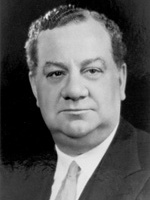William Warren Barbour
William Warren Barbour (born July 31, 1888 in Monmouth Beach , Monmouth County , New Jersey , † November 22, 1943 in Washington, DC ) was an American politician . Between 1931 and 1943 he represented the state of New Jersey in the US Senate , with a brief interruption in 1937 and 1938 .
Career
William Barbour attended public schools in his homeland. In 1906 he graduated from Browning School in New York City . He also began studying at Princeton University , which he soon dropped out to join his father's textile company, which mainly produced sewing thread and the like. After his father's death in 1917, he succeeded the company as head of the company. In the meantime he was a successful amateur boxer in the heavyweight class. He was masters in the United States and Canada in 1910 and 1911. He was also a member of the New York State National Guard for ten years . In this capacity he was deployed on the border there in 1916 during a border conflict with Mexico . He achieved the rank of captain. He then moved to Rumson, New Jersey. There he began a political career as a member of the Republican Party . In 1922 he became a member of Rumson City Council and from 1923 to 1928 he held the office of mayor of that city. At the same time he was still the head of his textile company. He also joined various other companies. Since 1930 he lived in the city of Locust, also in New Jersey.
After the death of US Senator Dwight Morrow , William Barbour was appointed as his successor as Class 2 Senator in Congress . There he took up his mandate on December 1, 1931. In November 1932, the official by-election for this mandate took place, which he won in favor of the Democrats , even against the federal trend at the time . This enabled him to end his predecessor's term of office by January 3, 1937. During his tenure in Congress, many of the federal government's New Deal laws were passed under President Franklin D. Roosevelt . In 1935 the provisions of the 20th Amendment to the Constitution were applied for the first time , according to which the legislative period of the Congress ends or begins on January 3rd. Accordingly, the beginning of the President's term of office was brought forward to January 20. Previously, the legislative terms of Congress and the term of office of the President began on March 4th.
In 1936, Barbour was not re-elected. After leaving Congress, he resumed his previous activities. In 1937 he was also a member of his state's Unemployment Compensation Commission. After the resignation of US Senator (Class 1) A. Harry Moore , who had been elected Governor , John Gerald Milton was first appointed as his successor in the Senate. Interestingly, he was nominated by Moore himself in his new capacity as governor. Moore could thus determine his own successor in Congress. Milton did not run for the actual by-election in November 1938. This election was won by William Barbour, who returned to the US Senate on November 9, 1938. In 1940 he was confirmed in this mandate in the regular elections, which he was able to exercise until his death on November 22, 1943. Since 1941, the work of Congress has also been overshadowed by the events of World War II . In this context, Barbour stood up for the Jews persecuted by the Nazis.
Web links
- William Warren Barbour in the Biographical Directory of the United States Congress (English)
| personal data | |
|---|---|
| SURNAME | Barbour, William Warren |
| BRIEF DESCRIPTION | American politician |
| DATE OF BIRTH | July 31, 1888 |
| PLACE OF BIRTH | Monmouth Beach , Monmouth County , New Jersey |
| DATE OF DEATH | November 22, 1943 |
| Place of death | Washington, DC |

